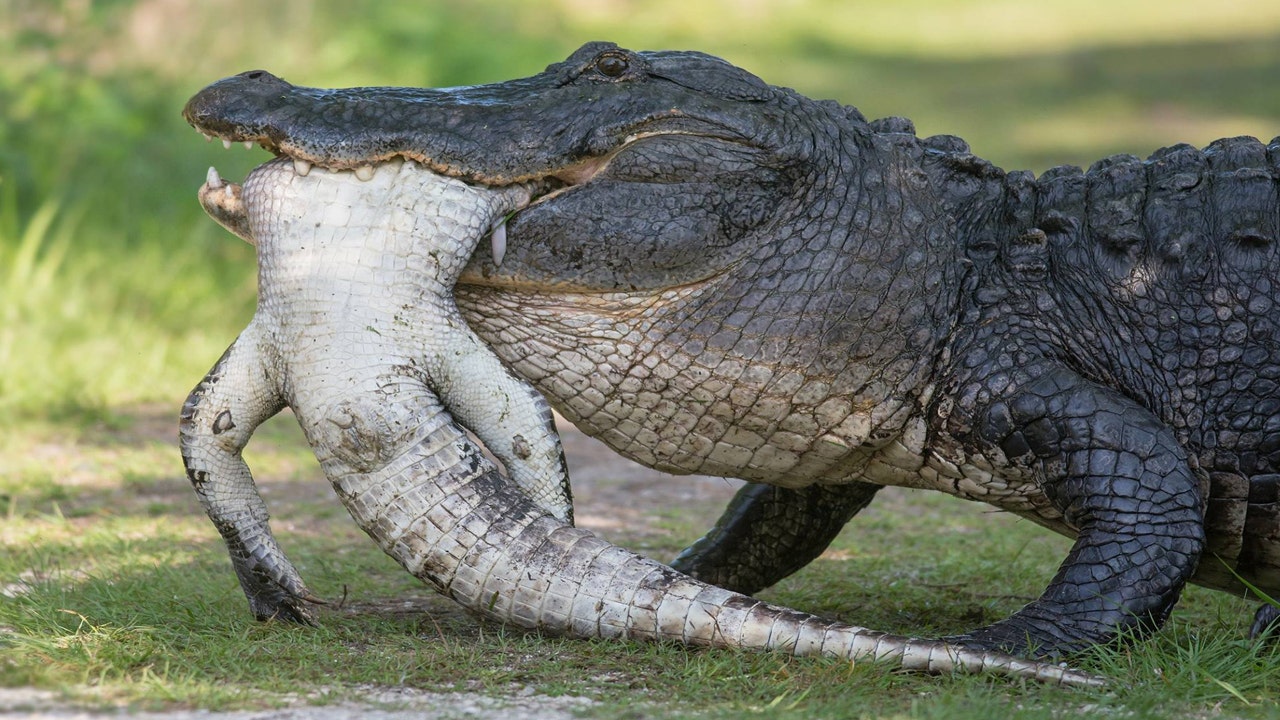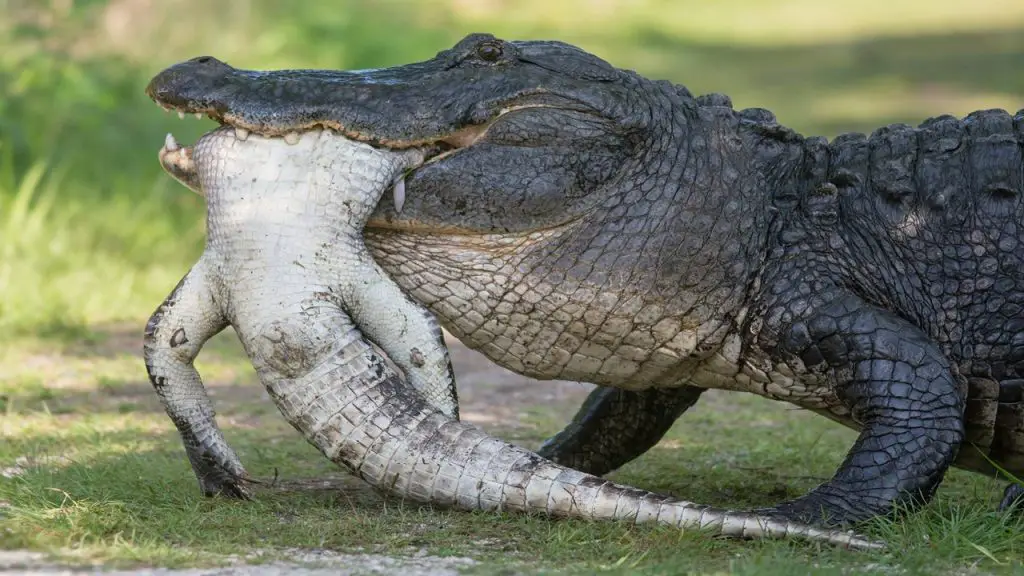Alligators are fascinating creatures that have been around for millions of years. They are known for their sharp teeth, powerful jaws, and ability to take down prey larger than themselves. However, one of the most puzzling behaviors of alligators is their tendency to cannibalize each other.
While it may seem strange for animals of the same species to prey on one another, there are actually several reasons why alligators engage in this behavior. From competition for resources to territorial disputes, understanding why alligators eat each other can provide valuable insight into their social dynamics and survival strategies.
Alligators eat each other due to competition for resources, territorial disputes, and cannibalistic behavior. While it may seem gruesome, this behavior is actually quite common among alligator populations. Younger alligators are particularly vulnerable to being eaten by larger ones, and in some cases, even adult alligators can become prey to their own kind. This behavior helps to maintain a balance within the ecosystem and ensures that only the strongest and fittest alligators survive.

Why Do Alligators Eat Each Other?
Alligators are known for their ferocious nature and their ability to prey on smaller animals, but what is not widely known is that they also prey on each other. This behavior is not common, but it does occur in the wild. There are several reasons why alligators eat each other, and this article will explore some of these reasons.
Competition for resources
Alligators live in areas where resources such as food and water are limited. This means that they have to compete with each other for these resources. When resources are scarce, alligators may turn to cannibalism as a way to survive. Larger alligators will eat smaller ones in order to eliminate competition for resources.
In addition, alligators are opportunistic feeders and will eat almost anything that they can overpower. This means that they may view other alligators as potential prey, especially if they are weak or injured.
Territorial behavior
Alligators are territorial animals and will defend their territory against other alligators. This territorial behavior can sometimes lead to cannibalism. If a smaller alligator enters the territory of a larger alligator, the larger alligator may view it as a threat and attack it. This can result in the smaller alligator being killed and eaten by the larger one.
Mating behavior
During mating season, male alligators become very aggressive and will fight with each other for the right to mate with a female. This competition can sometimes lead to cannibalism. If a male alligator wins a fight and kills another male, it may eat the loser as a way to eliminate competition for the female.
Benefits of cannibalism
While cannibalism may seem like a brutal and unnecessary behavior, there are actually some benefits to it. For example, cannibalism can help to regulate the alligator population. By eliminating weaker and smaller alligators, the stronger ones are able to survive and reproduce.
In addition, alligator cannibalism can help to recycle nutrients within the ecosystem. When alligators eat each other, the nutrients from the eaten alligator are transferred to the one doing the eating. This can help to maintain a healthy balance within the ecosystem.
Vs. Other animals
Cannibalism is not unique to alligators. Many other animals, including sharks, lions, and chimpanzees, have been known to eat members of their own species. However, the reasons for cannibalism vary depending on the species.
For example, in some species, cannibalism occurs as a result of competition for resources, while in others, it is a way to eliminate weak or sick members of the population. In some cases, cannibalism may be a form of social control or a way to establish dominance within the group.
Prevention of cannibalism
While cannibalism is a natural behavior for alligators, there are some measures that can be taken to prevent it from occurring. One way to prevent alligator cannibalism is to ensure that there is enough food and water available for all members of the population.
In addition, it is important to maintain a healthy alligator population. This means monitoring the population and removing any sick or injured alligators that may be more vulnerable to cannibalism.
Conclusion
In conclusion, alligator cannibalism is a natural behavior that occurs for a variety of reasons. While it may seem brutal, it serves an important role in regulating the alligator population and maintaining a healthy ecosystem. By understanding the reasons why alligators eat each other, we can take steps to prevent this behavior and ensure the continued survival of these magnificent animals.
Frequently Asked Questions
Here are some commonly asked questions about alligators and their behavior.
What are some reasons why alligators eat each other?
Alligators are known to be cannibalistic and will eat other alligators for various reasons. One reason is competition for resources, such as food and territory. In times of drought or when the water level drops, alligators may become more aggressive and territorial, leading to cannibalism. Additionally, younger alligators may be eaten by larger ones as a way to eliminate competition for resources and increase the chances of survival.
Another reason for alligator cannibalism is simply opportunistic feeding. Alligators are apex predators and will eat anything that they can overpower, including other alligators. This behavior is not uncommon in the animal kingdom, as many predators will eat members of their own species under certain circumstances.
How common is alligator cannibalism?
Alligator cannibalism is not a common occurrence, but it does happen. Cannibalism is more common among younger alligators, as they are more vulnerable to predation and competition from larger alligators. However, adult alligators have also been known to eat each other, particularly during times of food scarcity or territorial disputes.
While cannibalism is not a regular part of alligator behavior, it is a natural behavior that occurs in many animal species, particularly those that are apex predators.
Do alligators only eat other alligators?
No, alligators will eat a variety of prey, including fish, birds, mammals, and reptiles. While alligator cannibalism is a known behavior, it is not the primary source of food for alligators. They are opportunistic feeders and will eat whatever prey is available and within their size range.
Alligators are also known to scavenge for food, particularly during times of food scarcity. They will consume carrion, which includes dead animals, as well as garbage and other human food sources.
What are the risks of alligator cannibalism?
Alligator cannibalism poses few risks to humans, as alligators typically avoid human contact. However, it can be a concern for conservation efforts, as it can reduce the overall population of alligators. Additionally, cannibalism can be a sign of environmental stress, such as habitat destruction, pollution, and overfishing, which can negatively impact the alligator population and the ecosystem as a whole.
Researchers and conservationists monitor alligator populations to understand the factors that contribute to cannibalism and other behaviors. By understanding the natural behavior of alligators, efforts can be made to protect and conserve these important apex predators.
Can alligator cannibalism be prevented?
Alligator cannibalism is a natural behavior that cannot be prevented entirely. However, efforts can be made to reduce the factors that contribute to cannibalism, such as habitat destruction and overfishing. By protecting the natural habitat of alligators and ensuring that they have access to adequate food sources, the likelihood of cannibalism can be reduced.
Conservationists and researchers also work to monitor alligator populations and understand the factors that contribute to cannibalism. By studying alligator behavior and ecology, strategies can be developed to reduce the impact of cannibalism on the alligator population and the ecosystem as a whole.
Fatal Moments When Crocodiles And Alligators Eat Their Own Kind
In conclusion, the cannibalistic behavior of alligators is a complex phenomenon that has puzzled scientists for years. While some experts attribute it to territorial disputes, others believe it is driven by hunger, and some suggest that it may simply be a form of population control. Regardless of the reason, it is clear that alligators are not the gentle giants they are often portrayed to be.
As our understanding of these creatures continues to evolve, we may gain new insights into their behavior and the role it plays in the ecosystem. For now, all we can do is marvel at the incredible adaptability and resilience of these ancient reptiles, and hope that we can continue to coexist with them in a way that is sustainable for both species.
In the end, the question of why alligators eat each other may never be fully answered. But perhaps that is part of the magic of these mysterious creatures, and why they continue to captivate our imaginations.


